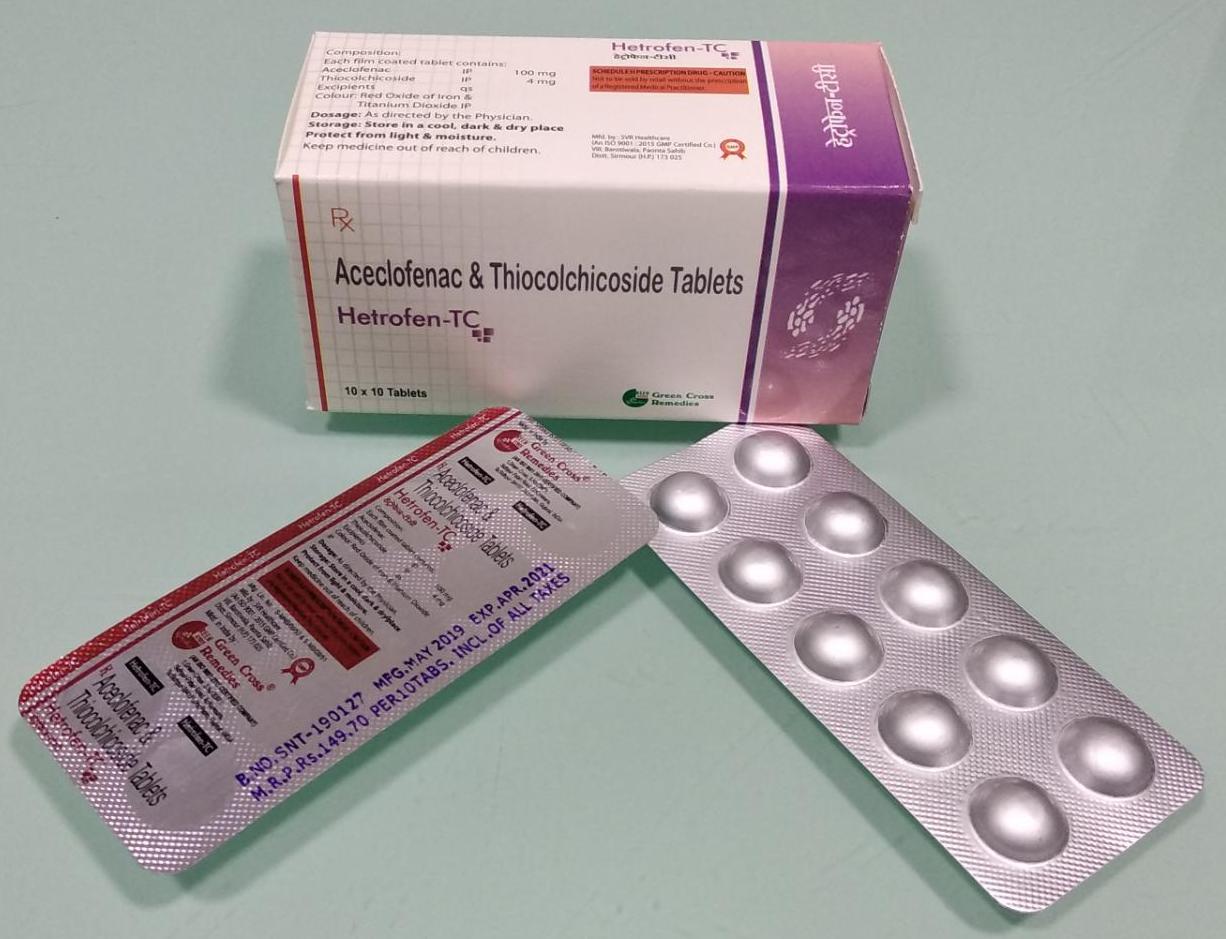HETROFEN TC TABLET
HETROFEN TC TABLET
Aceclofenac 100 mg,Thiocolchiside 4 mg Film Coated Tablets
Aceclofenac and Thiocolchicoside Tablets for Pain and Inflammation
Aceclofenac – Aceclofenac a nonsteroidal anti-inflammatory drug (NSAID) is used to relief pain and inflammation in rheumatoid arthritis, osteoarthritis, and ankylosing spondylitis. Aceclofenac should not be given to people with porphyria or breast-feeding mothers and is not recommended for children. It should be avoided near term in a pregnant woman because of the risk of having a patent ductus arteriosus in the neonate.
Thiocolchicoside – Thiocolchicoside is a muscle relaxant with anti-inflammatory and analgesic effects. It acts as a competitive GABAA receptor antagonist and also glycine receptor antagonist with similar potency and nicotinic acetylcholine receptors to a much lesser extent. It has a powerful convulsant activity and should not be used in seizure-prone individuals.
MECHANISM OF ACTION of Aceclofenac 100 mg,Thiocolchiside 4 mg (Hetrofen TC) Tablet : Acclor-T tablet, a combination of aceclofenac and thiocolchicoside is an anti-inflammatory painkiller. Aceclofenac works by blocking the effect of natural substances called cyclo-oxygenase (COX) enzymes. These enzymes help to make other chemicals in the body, called prostaglandins. Some prostaglandins are produced at sites of injury or damage and cause pain and inflammation. By blocking the effect of COX enzymes, fewer prostaglandins are produced, which means pain and inflammation are eased. Thiocolchicoside is a muscle relaxing agent that works through selective binding to the GABA-A receptor. It prevents muscle contractions by activating the GABA inhibitory motor pathway.
INDICATION Aceclofenac 100 mg,Thiocolchiside 4 mg (Hetrofen TC) Tablet :
- Musculoskeletal Acute low back pain
- Postoperative pain
- Neck and Shoulder pain
- Neuromuscular or muscle spasms
SIDE EFFECTS Aceclofenac 100 mg,Thiocolchiside 4 mg (Hetrofen TC) Tablet :
Some of the common side effects caused by aceclofenac and thiocolchicoside are:
- Itching and skin rash
- Swelling of face, lips, eyelids, tongue, hands, and feet
- Fainting and drowsiness
- Nausea and Vomiting
- Diarrhea
- Yellowing of skin and eyes
- Dry mouth
DOSAGE Aceclofenac 100 mg,Thiocolchiside 4 mg (Hetrofen TC) Tablet :
As directed by the physician.
STORAGE Aceclofenac 100 mg,Thiocolchiside 4 mg (Hetrofen TC) Tablet :
Store in a cool, dry and dark place.
Thiocolchicoside
It belongs to colchicine class. It has muscle relaxant, antiinflammatory, analgesic, and anesthetic action with minimal side effects. Rapidly onset of action is another unique feature of this drug. Its pharmacokinetic profile and metabolism still remain largely unknown.
Indications of Thiocolchicoside:
Thiocolchicoside is primarily indicated in conditions like Backache, Neuralgia, Pain, Parkinsonism, Sciatic pain.
Dosage of Thiocolchicoside:
Adults:Min/Max : 4mg/8mg orally 4mg intramuscularly.The relative pharmacological bioavailability of oral thiocolchiside v.s. intramuscular administration was calculated and represented 25%
Contra-Indications of Thiocolchicoside:
Allergic to Thiocolchicoside Hypersensitivity to Thiocolchicoside Peptic ulcer Acute Rhinitis Asthma If you have allergy towards Aceclofenac Breastfeeding Pregnant
Special Precautions of Thiocolchicoside:
Avoid driving and operate dangerous machinery, Gastro-intestinal disorders, History of gastroulceration, Limit alcoholic beverages, Patients recovering after a surgery, Severe cardiac, hepatic and renal impairment, Usage of diuretics
Side Effects of Thiocolchicoside:
Rash, Abdominal pain, Drowsiness, Gas, Allergen, Allergy, Sleepiness weakness, Allergic, Diarrhoea, Headache, Urge to vomit, Brief loss of consciousness, Symptoms due to exposure to sunlight, Dyspepsia, Nausea, Urticaria, Enuresis, Dizziness
Drug Interactions of Thiocolchicoside:
GABA, Strychnine
Aceclofenac
It is a phenyl acetic acid derivative showing effective anti-inflammatory and analgesic properties, and a good tolerability profile in a variety of painful conditions. Aceclofenac has been shown to exert effects on many mediators of inflammation. It inhibits synthesis of the inflammatory cytokines interleukin-1b and tumour necrosis factor, and inhibits prostaglandin E2 production. In vitro data indicate inhibition of cyclo-oxygenase by aceclofenac in whole blood assays, with selectivity for COX-2 being evident. A unique feature of aceclofenac's pharmacology is that it, unlike diclofenac and some other NSAIDs, stimulates glycosaminoglycans (GAG) synthesis.
Indications of Aceclofenac
For the relief of pain and inflammation in osteoarthritis, rheumatoid arthritis and ankylosing spondylitis.
Dosage of Aceclofenac
100mg orally b.i.d. Dosage reductions are recommended in patients with hepatic impairment, with a suggested initial dosage of 100mg/day.
Contra-Indications of Aceclofenac
Hypersensitivity, GI bleeding, moderate to severe renal impairment, last three months of pregnancy
Special Precautions of Aceclofenac
Patients with GI disease, history of peptic ulceration, cerebrovascular bleeding, ulcerative colitis, Crohn's disease, systemic lupus erythmatosus, porphyria, hematopoietic or coagulation disorders. The dose should be reduced in patients with mild to moderate hepatic, renal or cardiac function impairment.
Side Effects of Aceclofenac
Indigestion, heartburn, dyspepsia, diarrhoea, nausea, abdominal pain and flatulence.
Drug Interactions of Aceclofenac
Aceclofenac may increase the plasma conc. of lithium and digoxin. Aceclofenac may inhibit the activity of diuretics. Activity of anticoagulants may be enhanced. Convulsions may occur due to interaction between quinolones and NSAIDs.
FOR USE OF REGISTERED MEDICAL PRACTITIONER OR A HOSPITAL ONLY

